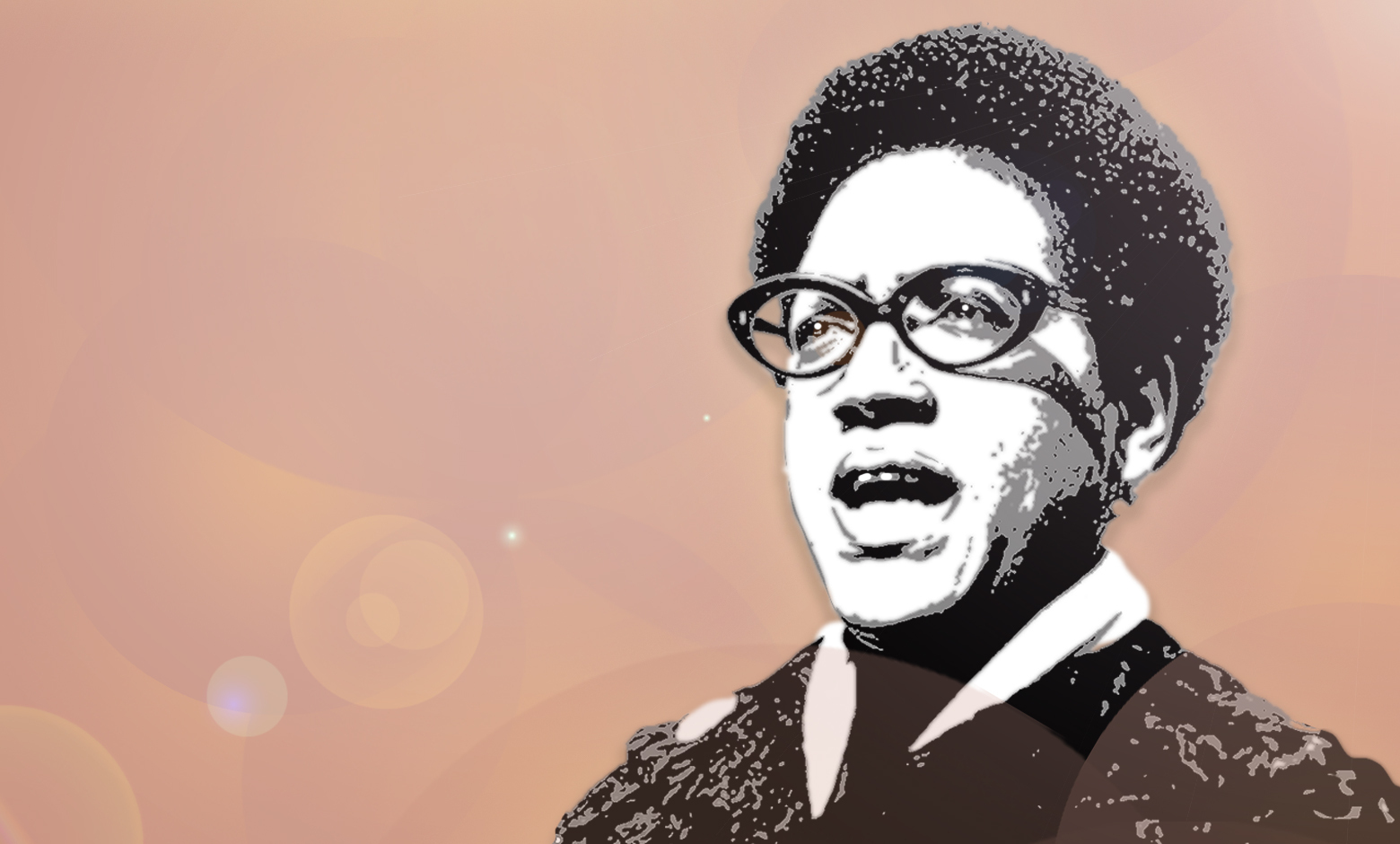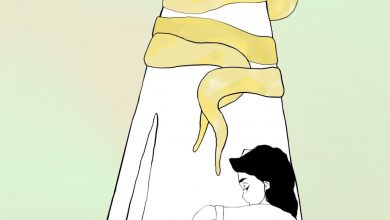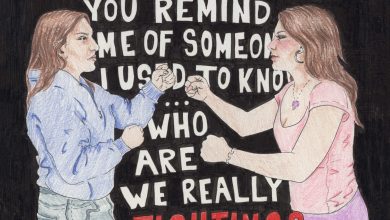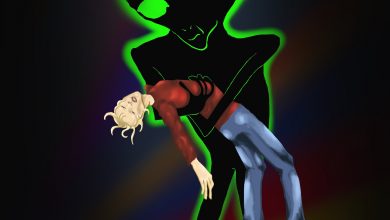Feminist Theorist Thursdays: Audre Lorde

Design by Emma Lehman
Image description: A black-and-white image of Audre Lorde speaking over a tan background
Audre Lorde (1934-1992) was a poet, feminist, civil rights activist, and librarian. Lorde often self-identified as “Black, lesbian, mother, warrior, poet,” all aspects of her identity that shaped the course of her life and work until her death. She grew up in Harlem, New York during the Great Depression, and her upbringing as a daughter of Grenadian immigrants heavily influenced her writing. Lorde’s relationship with her parents, especially her mother, was fraught with conflict. Most of her childhood was spent attending Catholic schools, and she eventually went on to graduate from Hunter College and Columbia University before becoming a librarian and teacher.
Lorde writes about difference and her own struggles as a Black lesbian during an era in which feminism explicitly excluded women who were not white and straight.
Her poems, essays and speeches are incredibly wide-ranging, covering issues such as race, gender, sexuality, and class.
Lorde first and foremost thought of herself as a poet, although her essays, speeches, and prose fiction have been extremely influential as well. She began writing at a young age, and utilized poetry to escape the restrictions of her strict, religious upbringing and the daily challenges she faced as a Black girl growing up in the 1930s and 40s. Lorde’s poetry is deeply infused with her personal experiences as a Black lesbian. She does not shy away from discussions of race, sexuality, ability, gender, age, and class in her poems or other writings. As a result, Lorde’s poetry is often extremely personal, yet at the same time political and revolutionary.
The short poem “Who Said It Was Simple” is both a critique of the exclusionary nature of white feminism and an expression of Lorde’s personal experience of marginalization as a Black queer woman. Quite often, Lorde contemplates her role as an outsider to the feminist, queer, and Black communities. Her gender, her race, her sexuality — all the different aspects of her identity — felt in many ways torn apart by non-intersectional feminism and other social movements which privileged whiteness, heterosexuality, and traditional femininity.
Lorde also writes powerfully about anger and the need to channel one’s rage into speech. In her poem “A Litany for Survival,” she writes, “…when we speak we are afraid / our words will not be heard / nor welcomed / but when we are silent / we are still afraid / So it is better to speak / remembering / we were never meant to survive.” Lorde saw anger as courageous, useful, and incredibly human. While she recognizes the fear and risk in speaking one’s truth, she understands that there are even greater risks in remaining silent. In her essay “Uses of Anger,” Lorde builds upon this sentiment. She describes the personal encounters she has had that have fueled her anger at privilege, exclusion, stereotypes, and silence:
“Every woman has a well-stocked arsenal of anger potentially useful
against those oppressions, personal and institutional, which brought that
anger into being. Focused with precision, it can become a powerful source
of energy serving progress and change. And when I speak of change, I
do not mean a simple switch of positions or a temporary lessening of ten-
sions, nor the ability to smile or feel good. I am speaking of a basic and
radical alteration in all those assumptions underlining our lives.”
Lorde writes to call out white women, but she also writes to inspire and educate women of color on the ways in which racism and anger are intensely personal and embodied experiences. It’s appropriate to respond to racism with anger and even rage, Lorde says. She criticizes those who react to anger with guilt, or who are more afraid of the anger of women of color than they are of racist attitudes and beliefs. The anger of Black women, she writes, is about survival, not destruction.
Although Lorde felt that poetry was the most powerful medium for expressing her thoughts and feelings, her prose allows readers to grasp how her identity and life experiences impacted her politics. In “Zami: A New Spelling of My Name,” Lorde mixes elements of biography, history, and myth to produce what she terms a “biomythography” of her adolescence and early adulthood. “Zami” is an intensely personal narrative centered around Lorde’s sexuality and growing self-awareness of her various identities. She recalls how it felt growing up in a repressive immigrant household as a fat, queer, visually impaired, precocious and unruly young woman. Lorde’s complicated relationship with her mother echoes throughout the biomythography and the rest of her work.
“Zami” is also an honest depiction of the lesbian community and lesbian relationships during the 1950s and 60s. Lorde lets readers into her most vulnerable moments of loneliness, longing, and loss. At the same time, the biomythography is an account of the joy inherent in community and mutuality among what Lorde describes as women-oriented women.
Lorde’s most famous essay, titled “The Master’s Tools Will Not Dismantle the Master’s House,” advocates for a radical intersectional perspective on everyday life and politics. In the essay, Lorde describes her feelings about being one of two Black women invited to speak at a conference about the experience of American women. She expresses her frustrations with tokenism and exclusionary white feminism. “What does it mean when the tools of a racist patriarchy are used to examine the fruits of that same patriarchy?” Lorde asks. “If white American feminist theory need not deal with the differences between us, and the resulting difference in our oppressions, then how do you deal with the fact that the women who clean your houses and tend your children while you attend conferences on feminist theory are, for the most part, poor women and women of Color?” The tokenism, inequality and exclusionary practices that Lorde describes in this essay remain incredibly relevant to mainstream and academic feminism today. In Lorde’s time and our own, feminist movements too often ignore the experiences of marginalized women when fighting for change. Ultimately, Lorde claims, we cannot rely on existing power structures to solve the problems that women face. We cannot compromise our rights to satisfy those in power. Rather, we must understand and use our differences as tools for fundamental change.
Lorde’s later poems and essays are heavily influenced by her experience as a mother and her fight against breast cancer. In “The Cancer Journals,” she recalls her experiences with terminal illness and her lifelong journey as a civil rights advocate. Lorde’s relationships with death and marginalization inform her famous speech titled “The Transformation of Silence into Language and Action.” In this essay, she examines silence and the ways in which power is used to silence those who are marginalized. Beyond encouraging individuals to pursue truth despite fear, Lorde also calls upon feminists to challenge norms of language and action. In one example she provides, Lorde asks why white women are comfortable teaching the writing of white men, but not of Black women. She argues that we cannot let the fears of difference and separation prevent us from breaking silences and building bridges between communities.
Lorde’s writing also encompasses neocolonialism, homophobia, sexism within the feminist and Black communities, state-sanctioned violence against Black people, academic sexism and racism, the erotic, and many other topics. As a woman in academia and a librarian, much of Lorde’s work is informed by research and her passion for education. Later in her life, Lorde established Kitchen Table: Women of Color Press, a publication company committed to amplifying Black women’s work. She also continued to advocate for the rights of Black women globally through writing, teaching, and activism.
Audre Lorde’s groundbreaking poems, essays, and speeches have become foundational to intersectional feminism, critical race theory, and queer studies. Although Lorde passed away from cancer nearly 30 years ago, her revolutionary and moving words persist.




